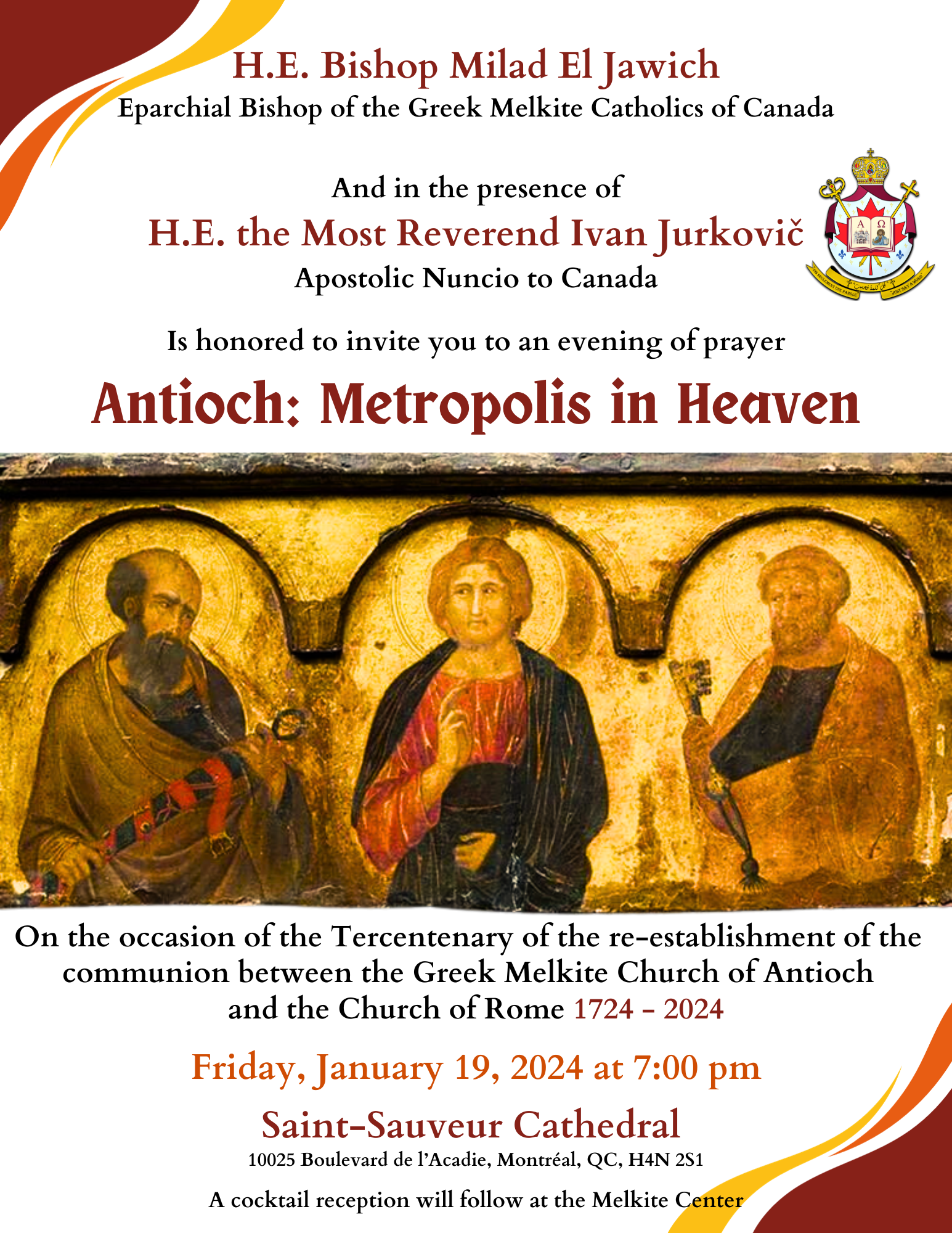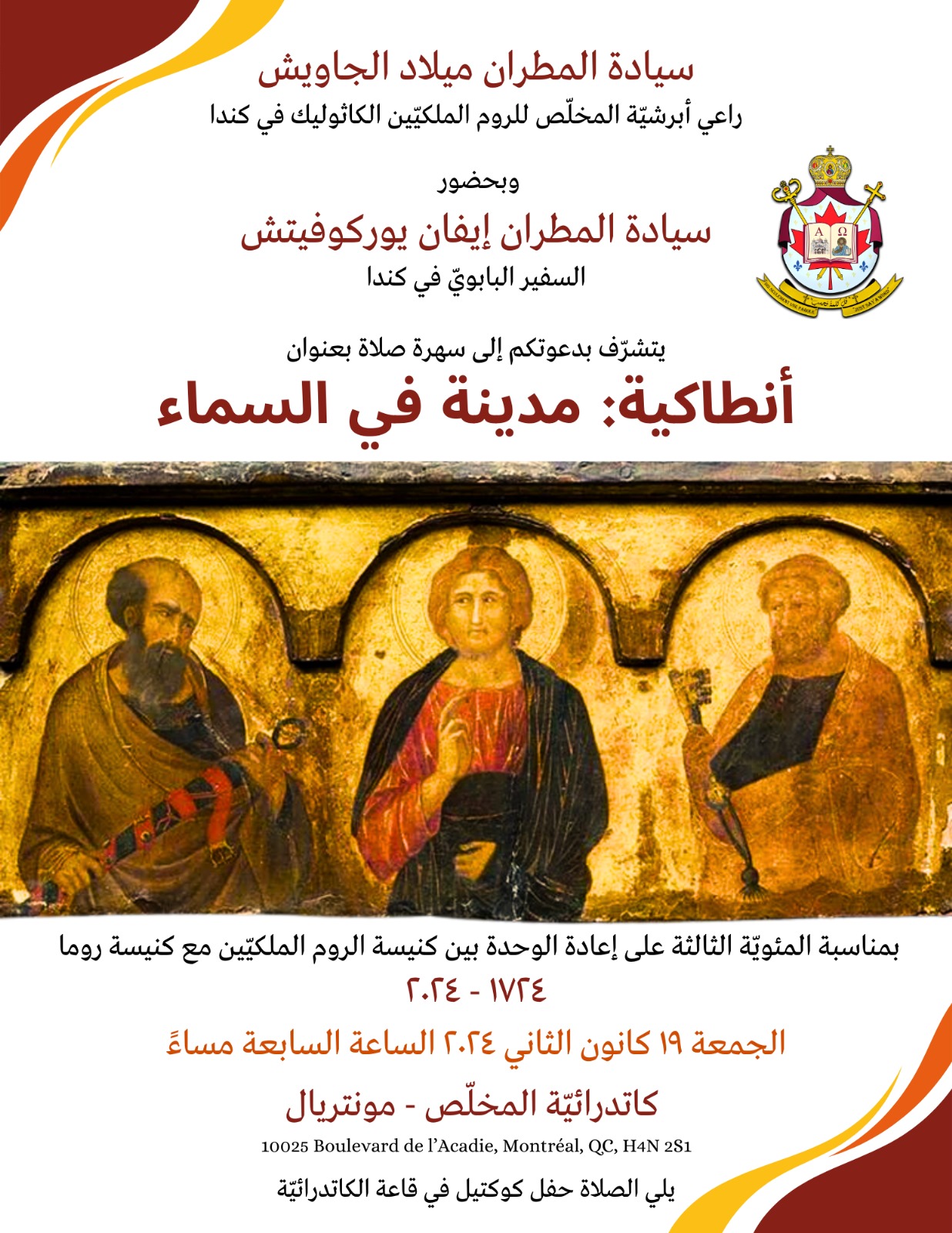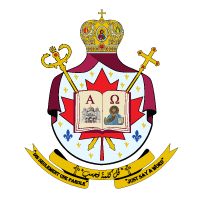Celebrating the Tercentenary of the re-establishment of ecclesial communion between the Antiochian Greek-Melkite Church and the Church of Rome is far from being a jubilee of joy, especially as the division that took place in the 18th century within the Antiochian Greek Mother Church still exists between Greek Catholics and Greek Orthodox. I see this occasion more as an opportunity to take an awareness of our ecclesial existence, our joys and sorrows, our glories and sins. The Jubilee will only be fully celebrated when we realize the dearest wish of our Lord, that all his sons and daughters be united in love and witness to the Gospel.
This Tercentenary is not our Church’s birthday. We were not born in 1724. In fact, our Church is an apostolic, patristic, conciliar Church, hereditary of a great Antiochian Tradition, that was formed in the age of the first Apostles and passed down through the centuries by their successors and the great Antiochian saints.
We have come and gone from Antioch, the birthplace of the Church of Jesus, the first missionary field of the Apostles, the glorious patriarchate of our ancestors (South of Asia-Minor, Syria, Lebanon, Palestine, Jordan, and all Orient). Antioch is the first Church, still original, still young and dynamic, flying above the divisions. Thanks to its central geographical position at the crossroads of ancient civilizations, it played the role of unifier, trying to encompass the different currents of the early Church. From her, Saint Paul embarked on his boundless missionary projects, and in her, Saint Peter also found a refuge with his more traditional tendencies.
The Church of Antioch was beyond division and must remain so. In my opinion, she is neither Orthodox, nor Catholic, nor Syriac, nor Arab... She is, however, all of these: Orthodox and Catholic at the same time, Greek and Syriac, Arab and Byzantine... She is above the fractions of men. If within her patriarchal territory there have been most of the divisions throughout Church history, it is through her that the whole Church will one day find its unity. In her, Christians must always “first of all be called Christians”, and nothing else, as the Book of Acts (11:26) clearly testifies.
Saint Basil the Great also eloquently states: “What could be more vital to the Churches of the whole world than Antioch? If it were to return to harmony, nothing would prevent it, like a head that has regained its strength, from communicating its health to the whole body” (Saint Basil the Great, Letter 66, 2). It is from Antioch itself that “the light of the East” (Orientale Lumen) emerges, according to the beautiful expression of Pope John Paul II, namely, the road that leads to global Christian unity.
I am a Salvatorian monk, priest and now bishop, and I belong to the Basilian Order of the Holy Savior, from whose heart the Melkite Catholic Church emerged in the 18th century. Our Founder Aftimios Saifi was one of the pioneers of the Catholic faith in the Greek Patriarchate of Antioch, and the first defender of the union with Rome, something which did not spare him persecution in those days. My religious affiliation does not prevent me from considering that the schism of 1724 was the result of a long and complicated historical process, marked on both sides Catholics and Orthodox, by incomprehension, misunderstanding, ignorance, rigidity, improvisation, rivalry, boundless ambition, blind nationalism, and so on. Weakened by the Arab invasion and internal conflicts, the Patriarchate of Antioch fell victim to the conflict between the two great sister Churches, each trying to pull it to its side: the Western Church of Rome and the Eastern Church of Constantinople.
Let us put it more positively: within the eighteenth-century Church of Antioch, two currents emerged, each of which initially had good intentions: the pro-Catholic current dreamed of re-establishing the communion of the Church of Antioch with the Church of Rome and reuniting the Church of God under the roof of the Successor of Peter as in the first century, while the pro-Orthodox current was afraid of the ancient attempts at Latinization and was more attached to Orthodoxy. Although the intentions of both currents were good, the ways used were often not in accordance with God’s heart.
Antioch, “the city of God”, deserves a new way of looking at things, a new approach to rereading history and rebuilding the desired unity. It is no longer a case of “us and you”, but “us and us”, nor of folding the other in fixed frames “we, who have the good faith, and you, the heretics”, while we are “all schismatics”, according to the beautiful expression of Mgr. Elias Zoghbi. Antioch deserves from us the audacity to seek new roads that lead to unity.
To be Catholic is, first and foremost, to be a universal Christian, a member of the Church of God that spread to the four corners of the world; it means living out diversity within unicity; it means benefiting from the infinite wealth of its philosophical and theological currents; it means being open to changes, open to the various adaptations of the Word of God in today’s world. Above all, it means refusing to confine oneself to fatal chauvinism or blind fanaticism. To be Catholic is to know how to embrace all in the heart of God.
To be Orthodox, moreover, is above all, an uprightness of heart and a living in Christ; it is an elegance in the way of loving, not just the way we pray or sing. Orthodoxy is above all, as the quintessential Orthodox Mgr. Georges Khodr puts it, “rootedness in Christ” (انغماس في المسيح) more than rootedness in rites. Rites are only a road to Christ, otherwise they become a means for self-glorification.
Antioch, “a city in Heaven”. What a beautiful expression from Saint John Chrysostom, son of Antioch! It is less the heavenly sky that’s above us, but rather, the heaven that’s being lived out here on earth: a city where the Lord’s love is lived out in its original, pure, simple, and evangelical version.
Antioch is not just a territory, a history, a patriarchate... It is above all a value to pass on to our children, especially here in the Diaspora: the value of being above all a “Christian”, just a Christian without denomination, being apostolic in faith, universal in spirit, authentic in rootedness in Christ, crazy in the love of the Lord and of his mother the Virgin Mary, Mother of God. Amen.
+ Bishop Milad El Jawich
Eparchial Bishop for the Melkite Greek Catholics in Canada


